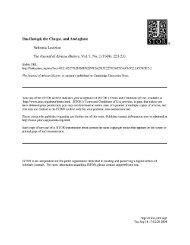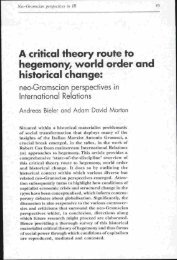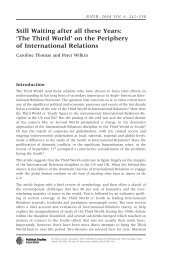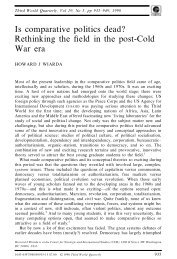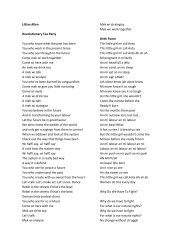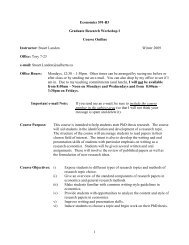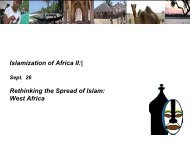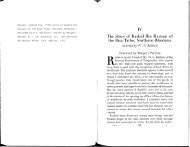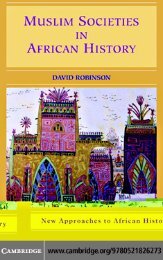2 Ethnocentric Projection and the Study of Kinship
2 Ethnocentric Projection and the Study of Kinship
2 Ethnocentric Projection and the Study of Kinship
Create successful ePaper yourself
Turn your PDF publications into a flip-book with our unique Google optimized e-Paper software.
<strong>Ethnocentric</strong> <strong>Projection</strong> <strong>and</strong> <strong>the</strong> <strong>Study</strong> <strong>of</strong> <strong>Kinship</strong> … May 2008 2<br />
though 20 th -century anthropologists, ranging from Malinowski <strong>and</strong> Boas early in <strong>the</strong> century,<br />
through to Radcliffe-Brown <strong>and</strong> Levi Strauss early in its second half, strived to define <strong>the</strong>ir<br />
own approaches to underst<strong>and</strong>ing large-scale social structure, difference, <strong>and</strong> change within<br />
<strong>and</strong> across different societies in opposition to <strong>the</strong> early focus on “primitive societies”. As<br />
Adam Kuper says in his broad-brush summary <strong>of</strong> this early work <strong>and</strong> its influence,<br />
The idea <strong>of</strong> primitive social structure that crystallized in <strong>the</strong> late nineteenth century<br />
was remarkably simple. Primitive society was originally an organic whole. It <strong>the</strong>n<br />
split into two or more identical blocks, made up <strong>of</strong> exogamous, corporate descent<br />
groups. There were no families. Women <strong>and</strong> goods were held in common by men<br />
<strong>of</strong> each group. Marriage took <strong>the</strong> form <strong>of</strong> regular exchanges between <strong>the</strong>m.<br />
Anthropologists worked on this conception for more than a century. The<br />
prototype <strong>of</strong> primitive society became an ideal type, which directed <strong>and</strong> ordered<br />
empirical studies. Finally it evolved into a model that lent itself to formal<br />
manipulation, particularly in <strong>the</strong> field <strong>of</strong> kinship studies. <strong>Kinship</strong> itself became <strong>the</strong><br />
technical core <strong>of</strong> social anthropology. (2005, p.219)<br />
Calls from within anthropology to rethink kinship <strong>and</strong> its role in society have recurred<br />
throughout <strong>the</strong> 20 th -century. During <strong>the</strong> 1970s, such calls ga<strong>the</strong>red sufficient momentum,<br />
overlap, <strong>and</strong> direction to constitute a distinctive challenge to <strong>the</strong> central place that kinship<br />
had occupied for <strong>the</strong> preceding hundred years. A condition for <strong>the</strong> success <strong>of</strong> this challenge<br />
was a wave <strong>of</strong> <strong>the</strong>oretical enrichment that saw <strong>the</strong> development <strong>and</strong> appropriation <strong>of</strong> a<br />
number <strong>of</strong> distinct substantive <strong>the</strong>ories <strong>of</strong> large-scale social structure, a wave that brought<br />
about paradigm shifts to <strong>the</strong> whole field <strong>of</strong> cultural anthropology (see Ortner 1984).<br />
Included here are <strong>the</strong> development <strong>of</strong> symbolic anthropology <strong>and</strong> <strong>the</strong> corresponding<br />
interpretive turn within cultural anthropology in <strong>the</strong> 1960s; <strong>the</strong> appropriations <strong>of</strong> Marxist<br />
ideas in both structural <strong>and</strong> cultural forms in <strong>the</strong> 1970s; <strong>and</strong> <strong>the</strong> rise <strong>and</strong> evolution <strong>of</strong><br />
feminist <strong>the</strong>ory <strong>and</strong> <strong>the</strong> corresponding focus on gender dynamics within social structures<br />
throughout <strong>the</strong> past 40 years. These <strong>the</strong>oretical developments unfolded against a<br />
background <strong>of</strong> broader political changes in European <strong>and</strong> North American societies, as well<br />
as along with changes in <strong>the</strong> organization <strong>of</strong> academic units, fields, <strong>and</strong> disciplines.<br />
Such <strong>the</strong>oretical <strong>and</strong> political changes may well have sufficed to shift <strong>the</strong> study <strong>of</strong><br />
kinship from centre stage within cultural anthropology, but <strong>the</strong> resulting change here was<br />
also facilitated by insider reflections on <strong>the</strong> study <strong>of</strong> kinship itself. The most sustained <strong>and</strong><br />
influential <strong>of</strong> <strong>the</strong>se were those <strong>of</strong> David Schneider, whose influence is acknowledged in<br />
anthropologists’ own reflections on <strong>the</strong> shifts <strong>and</strong> changes in kinship studies (e.g.,<br />
Yanagisako <strong>and</strong> Collier 1987, Stra<strong>the</strong>rn 1992, Carsten 2004). In American <strong>Kinship</strong> (1968)<br />
Schneider made explicit his focus on “<strong>the</strong> symbols which are American kinship” (1968:18), a<br />
phrase foregrounding both his emphasis on meaning <strong>and</strong> on kinship in <strong>the</strong> West. Schneider<br />
went on, in A Critique <strong>of</strong> <strong>the</strong> <strong>Study</strong> <strong>of</strong> <strong>Kinship</strong> (1984) to <strong>of</strong>fer a sweeping indictment <strong>of</strong><br />
traditional anthropological studies <strong>of</strong> kinship, identifying <strong>and</strong> rejecting a putatively<br />
fundamental assumption underlying kinship studies, what he called <strong>the</strong> Blood is Thicker than<br />
Water assumption. Schneider’s rejection <strong>of</strong> this assumption was <strong>the</strong> basis for both his own<br />
skepticism about “kinship studies”, <strong>and</strong> for much <strong>of</strong> <strong>the</strong> work that has subsequently been<br />
undertaken self-consciously under <strong>the</strong> heading “rethinking kinship” (e.g., Carsten 2000,<br />
Collier <strong>and</strong> Yanagisako 1987, Franklin 2006, 2007, Franklin <strong>and</strong> McKinnon 2001, Stra<strong>the</strong>rn<br />
1992, 2005).<br />
2. The New <strong>Kinship</strong> Studies



